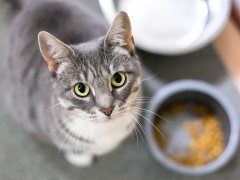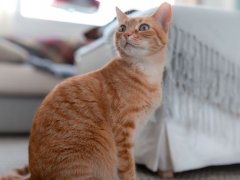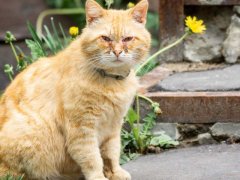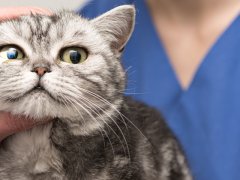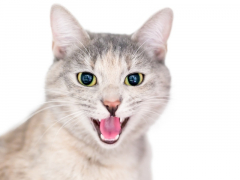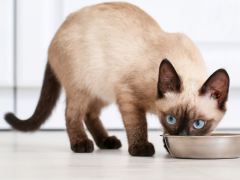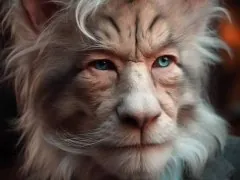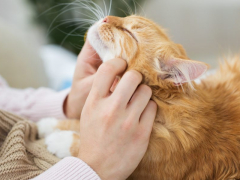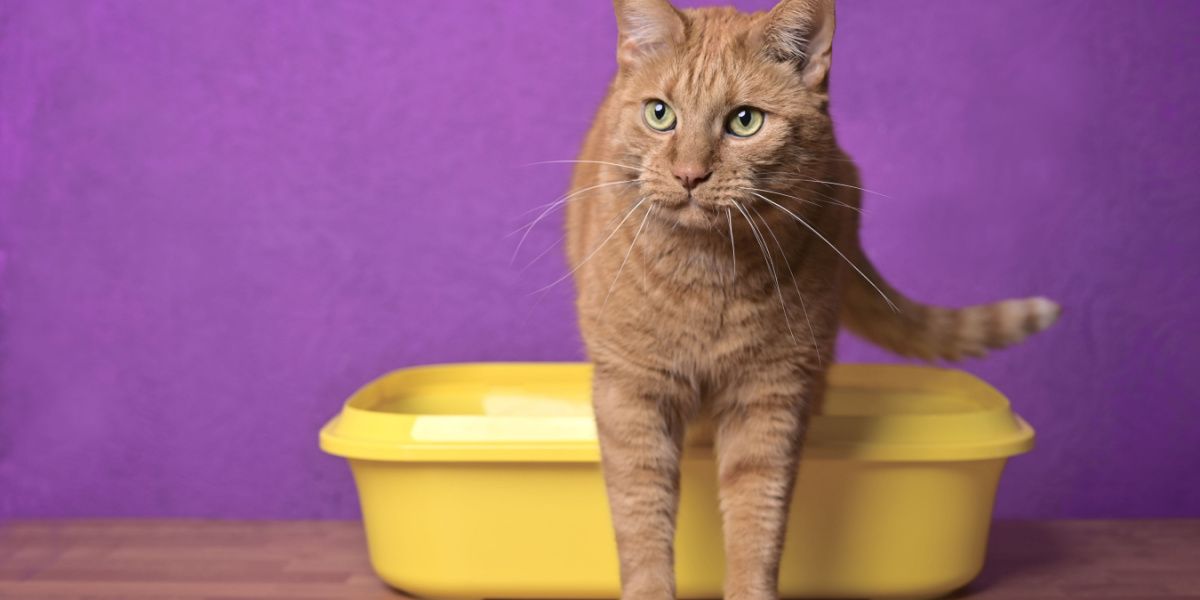
Diarrhea is not pleasant for anyone, including our kitties. It smells bad, looks bad, and (sometimes) sounds bad as well. It also feels pretty bad for the creature who has it. When diarrhea affects your cat, you may be wondering if anti-diarrhea medicine for cats is a thing.
In this article, you’ll learn about medications and supplements that are commonly used for diarrhea. You will also learn about the causes of diarrhea, how and when it’s okay to provide at-home therapy for your cat, and when it’s time to visit your vet.
Just like in humans, diarrhea in cats is a symptom of an underlying issue, disease or condition. There are a number of ways to treat diarrhea in cats, from dietary changes, to using probiotics and medications. Severe and/or persistent diarrhea in cats that lasts for 2-3 days is enough to warrant a trip to the vet.Key Takeaways
What Is Diarrhea?
Diarrhea is the term used when stools are very runny and watery. It is not a disease on its own, but rather a sign or symptom of something else going on in the body. Diarrhea is problematic because it can cause loss of fluid and electrolytes, leading to dehydration.
Also Read: The 9 Best Cat Foods For Diarrhea
What Causes Diarrhea?
Diarrhea can have many different causes. When a veterinarian is considering a patient with diarrhea, they’re going to think about a number of factors. These are important for you to think about as well if your kitty suddenly develops diarrhea and you’re trying to understand why.
Here are a couple of questions to ask:
- Did the diarrhea just start or has it been a chronic issue for over a week? Acute onset diarrhea is most likely associated with something that happened recently. Chronic diarrhea can be an indication of another possibly more complicated underlying cause.
- Is this a younger cat or an older cat? Younger cats may be more prone to dietary indiscretion (like counter/table-surfing or eating non-food items), intestinal parasites, or sensitivities to diet changes. In older cats, other diseases like liver disease, inflammatory bowel, or cancer may be more associated with chronic diarrhea.
- Has there been any change in diet recently? Any new food or dietary change can lead to diarrhea, especially if this change was not gradual. The body needs time to adjust to new ingredients or nutrient profiles. Food intolerances can also lead to diarrhea.
- Has any weight loss occurred? If unexpected weight loss is also present, whether with acute or chronic diarrhea, this is often an indicator of a more concerning underlying disease.
- What does the diarrhea look like? Diarrhea can be more watery with mucus, straining may occur, and sometimes fresh blood is present. These are signs of large intestinal diarrhea or colitis. Diarrhea that has more volume and substance or that has dark black sticky/tarry signs of blood called melena, is from the small intestine.
- Did the cat ingest things they shouldn’t? If your cat is a regular counter or table surfer or seeks out non-food items to chew on, acute onset of diarrhea may be a result of one of these behaviors.
- Are there other signs of illness? If diarrhea is ever coupled with other signs of illness, like vomiting, poor appetite, weight loss, or fever, there can be a greater concern for either a more serious condition.
Also Read: Vet-Approved Cat Stool Chart: Decoding Your Cat’s Poop
How Is Diarrhea Treated?
How diarrhea is treated depends on the underlying cause, as well as the severity.
Some mild or early cases of diarrhea may be treated at home, as long as no other signs of illness are seen. Some mild cases may resolve on their own in 1-2 days. Short-term use of a bland diet, like boiled chicken and rice combined with fiber supplementation and probiotics, can be an at-home strategy that can help.
If diarrhea is either more severe or has been very persistent for more than 2-3 days, a veterinary exam to seek a proper diagnosis and treatment is best.
Also Read: Digestive Enzymes For Cats: Everything You Need To Know
Medications That Help With Diarrhea in Cats
There are a couple of prescription medications your veterinarian may prescribe to treat your cat’s diarrhea.
Metronidazole (Flagyl)

There are several options for anti-diarrhea medicine for cats, depending on the severity and cause of the diarrhea.
Metronidazole is classified as an antibiotic and antiprotozoal/antiparasitic agent. It has proven efficacy against Giardia, which is a protozoal parasite that can cause diarrhea. This medication is often not the first choice of use, because it can also work against Clostridium bacteria, the overgrowth of which can contribute to diarrhea.
Although not well understood, metronidazole is thought to have some activity against cell-mediated immunity, a process that can be involved with inflammatory conditions like inflammatory bowel disease.
There are few clinical studies to support the use of metronidazole for generalized, non-specific diarrhea. Anecdotally many veterinarians feel that it helps shorten the course and severity of diarrhea.
Metronidazole is a generic human prescription medication. Oral tablet sizes are too large for many cats and the tablets typically need to be split into smaller pieces. A veterinarian may also choose to have the medication ordered through a compounding pharmacy to provide the most accurate dosing or to make the medication more palatable.
Metronidazole may commonly be used for 1-2 weeks. Long-term use may be elected in some cases.
Side effects of metronidazole are uncommon when prescribed at appropriate doses. Still, side effects can include vomiting and poor appetite. Higher doses and long-term therapy can carry risks of liver disease and neurologic toxicity.
Also Read: Drug Poisoning In Cats: Causes, Symptoms, & Treatment
Tylosin (Tylan Powder)
Tylosin is classified as a macrolide antibiotic. Only the oral powder form is used in cats. It is not often used as a first choice for treating diarrhea in cats. It is used most typically for chronic diarrhea or diarrhea that has not improved with other first-line therapies.
Tylosin is believed to have probiotic effects by increasing enterococci bacteria in the small intestine and may have direct anti-inflammatory effects. Similar to metronidazole, it is also thought to have effects on cell-mediated immunity.
Tylan powder is more commonly used over longer periods of time. Side effects are very uncommon with the oral powder form.
Also Read: Best Cat Food For IBD
Supplements That Help With Diarrhea in Cats
Therapies for diarrhea in cats often include strategies other than just medications since there are several avenues that contribute to bowel health and balance. There are generally two classifications of bowel health supplements: probiotics and fiber.
Probiotics
The goal of a probiotic is to increase the number of healthy bacteria in the digestive tract. Healthy bacteria, like Enterococcus faecium, Lactobacillus, Bifidobacterium, and some others, are required for healthy digestion. Reduced numbers of normal flora bacteria can lead to diarrhea. Other conditions contributing to diarrhea may also lead to overgrowth and imbalance of other bacteria like Clostridium.
There are many probiotic products out there. Fortiflora and Proviable are two of the most popular brands advocated by veterinarians. These products contain tens of billions of colony-forming units (CFUs) of beneficial bacteria strains.
Also Read: 10 Best Probiotics for Cats
Fiber Supplements
Diarrhea is loose, sometimes very watery, and moves its way through the GI tract at a rapid pace. Fiber, especially soluble fiber, helps to add bulk to the stool and slow down transit time.
Adding fiber to your cat’s diet can be tricky. This is because, depending on the ingredients, both soluble and insoluble fiber can be present. Insoluble fiber shortens intestinal transit time and helps more with constipation. Adding too much fiber can lead to a nutrient imbalance in the diet.
Pumpkin is a popular source of fiber. However, as discussed in The Problem with Pumpkin by Dr. Lisa Freeman with Tufts University, adding just a teaspoon of canned pumpkin to the diet is unlikely to provide much therapeutic fiber. As Dr. Freeman indicates, adding about 2 cups of pumpkin to your cat’s diet is the amount that would be needed to match a high-fiber therapeutic diet. However, doing so would throw the rest of your cat’s diet out of balance, and it wouldn’t be palatable for the cat.
Metamucil, which contains psyllium husk, is a source of soluble fiber that can help with diarrhea by absorbing fluid and adding bulk to the stool. Starting amounts are usually about ⅛ to ¼ of a teaspoon. It is very important to note that some cats can have a rare allergic reaction to psyllium, which manifests as itching and difficulty breathing. It is important to use unflavored forms of metamucil in pets.
The use of pectin is a common soluble dietary fiber source. Pectin is a type of starch derived from fruit. In supplements, it is often accompanied by kaolin, which is a clay-based adsorbent that pulls in water, toxins, and bacteria, helping to reduce water loss from diarrhea. Proviable is one product that comes as a kit containing kaolin and pectin in a paste form that can be administered orally by syringe.
Also Read: 4 Best Fiber Supplement For Cats With Diarrhea
Human Anti-Diarrheal Medications

Never use medicine made for human consumption without first consulting your veterinarian.
A common thought many pet parents may have if their cat is having diarrhea, is to reach for something the household already uses sitting in the medicine cabinet. Two of the most common items include Imodium (loperamide) and Pepto Bismol (bismuth subsalicylate).
The use of both of these products is controversial in cats and should only be considered through guidance from your veterinarian. While they can be used, they should only be for 2-3 days at the most. It is also worth noting that complications can arise.
Imodium acts as a weak narcotic, slowing down intestinal transit time. This can lead to constipation in cats and they can also experience an excitatory reaction to the drug as a side effect.
Pepto Bismol has to be used carefully with cats because higher or prolonged doses can lead to high levels of salicylates. Salicylate buildup can lead to effects like nausea and vomiting. Pepto Bismol will also change the color of stool to a black or dark green color, which can mimic the appearance of melena, a form of blood in the stool.
Also Read: Blood In Cat Urine (Hematuria): Causes, Symptoms, & Treatment
When To See A Vet For Your Cat’s Diarrhea
At-home care options for diarrhea are limited, so it’s important to know when to seek further help from your veterinarian. Generally, if any of the following conditions apply, you should schedule an exam as soon as possible.
- Other signs of illness accompany diarrhea (lethargy, weight loss, vomiting)
- Blood (either fresh red blood or black tar-like blood) is present in the stool.
- At-home methods have not been successful after 2-3 days.
Also Read: The 8 Best Cat Foods For Gassy Cats
Frequently Asked Questions
What can I give my cat for diarrhea?
There can be many different causes of diarrhea and the best thing to use will depend on what cause is responsible. A bland diet of boiled chicken and rice, probiotics, and soluble fiber supplements can all be used for 2-3 days as long as the cat’s condition doesn’t worsen. Human anti-diarrhea medications like Imodium and Pepto Bismol should not be used for cats without guidance from a veterinarian.
Can I give my cat Imodium for diarrhea?
While Imodium (loperamide) can be used for cats, it is best to seek guidance from your vet before using it. Imodium can cause excitatory behavior in cats. It can also cause constipation if not used carefully. Imodium also does not treat underlying causes of diarrhea in cats like parasites, bacterial imbalance, or intestinal tract inflammation.
Can cats have anti-diarrhea medicine?
It’s best to use anti-diarrhea medicine only as prescribed or recommended by your veterinarian. Over-the-counter medication for humans, like Imodium and Pepto Bismol, must be used very cautiously as they can have negative side effects in cats. There are medications more commonly used for pets, like metronidazole and tylosin, but they require a prescription from your vet.
-
Plumb DC. Imodium. In: Plumb DC, ed. Plumb's Veterinary Drug Handbook. 9th ed.
-
Plumb DC. Metamucil. In: Plumb DC, ed. Plumb's Veterinary Drug Handbook. 9th ed.
-
Plumb DC. Metronidazole. In: Plumb DC, ed. Plumb's Veterinary Drug Handbook. 9th ed.
-
Plumb DC. Tylosin. In: Plumb DC, ed. Plumb's Veterinary Drug Handbook. 9th ed.
